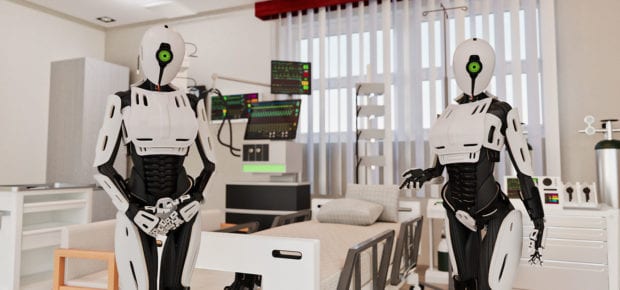November 25, 2019
A large responsibility of a nurse is to provide bedside service to ensure patients are comfortable during their hospital stay. Sometimes nurses can be called for a simple request such as turning on or off a TV, a light or playing calming music. AI nurses, robotic or voice-controlled, are now being used to provide bedside assistance and administer medications so human nurses can focus on their own workflow.
Some hospitals are already implementing these technologies with their patients. A voice-controlled software for the healthcare industry, called Avia, is currently being used in over 102 rooms at a hospital in Los Angeles, California. Avia assists patients with basic hospital room needs, as well as administering medicines.
“When a patient asks for pain medication, for example, Aiva sends a text to the appropriate nurse,” reports an IEEE Spectrum article. “If the request isn’t fulfilled, the notification goes up the chain to another caregiver. Plus, Avia responds to a patient by telling him or her that their request has been transmitted, providing comforting feedback that isn’t supplied by a traditional call button.”
See also How Humanoid Therapy Robots Will Help Older Adults Become More Self-Sufficient
Not only are AI nurses capable of notifying human nurses of medication times, they are also physically administering the correct dosage to patients as well.
“In certain hospitals there are already medication dispenser robots that retrieve the right medication packages for further delivering,” says IEEE member Antonio Espingareiro. “This is a very important topic since it helps to reduce the likelihood of human error when delivering medications and respective doses to patients.”
Overall, the use of AI technologies in hospitals will help human nurses focus on care and manage their time in an effective way to see more patients. But while an AI nurse has the potential to make a difference in healthcare, it’s important to recognize that this technology should not replace the importance of a human nurse for proper, supervised care.
“These technologies help to better manage resources and deliver the best care allied with classical human care, but be aware that they are not a substitute for human care,” warns Espingardeiro.
The goal of any nurse is to help patients receive attention, care and maintain a comfort level that will make their patient’s stay a little more pleasant. An assistive technology like an AI nurse is already making that goal more attainable– one hospital room at a time.






 Meaningful Momentum or Running in Place?
Meaningful Momentum or Running in Place? AI Through Our Ages
AI Through Our Ages Liquid Infrastructure: Our Planet's Most Precious Resource
Liquid Infrastructure: Our Planet's Most Precious Resource The Impact of Technology in 2025
The Impact of Technology in 2025 Quantum and AI: Safeguards or Threats to Cybersecurity?
Quantum and AI: Safeguards or Threats to Cybersecurity? Why AI Can't Live Without Us
Why AI Can't Live Without Us Bits, Bytes, Buildings and Bridges: Digital-Driven Infrastructure
Bits, Bytes, Buildings and Bridges: Digital-Driven Infrastructure Impact of Technology in 2024
Impact of Technology in 2024 Emerging AI Cybersecurity Challenges and Solutions
Emerging AI Cybersecurity Challenges and Solutions The Skies are Unlimited
The Skies are Unlimited Smart Cities 2030: How Tech is Reshaping Urbanscapes
Smart Cities 2030: How Tech is Reshaping Urbanscapes Impact of Technology 2023
Impact of Technology 2023 Cybersecurity for Life-Changing Innovations
Cybersecurity for Life-Changing Innovations Smarter Wearables Healthier Life
Smarter Wearables Healthier Life Infrastructure In Motion
Infrastructure In Motion The Impact of Tech in 2022 and Beyond
The Impact of Tech in 2022 and Beyond Cybersecurity, Technology and Protecting Our World
Cybersecurity, Technology and Protecting Our World How Technology Helps us Understand Our Health and Wellness
How Technology Helps us Understand Our Health and Wellness The Resilience of Humanity
The Resilience of Humanity Harnessing and Sustaining our Natural Resources
Harnessing and Sustaining our Natural Resources Creating Healthy Spaces Through Technology
Creating Healthy Spaces Through Technology Exceptional Infrastructure Challenges, Technology and Humanity
Exceptional Infrastructure Challenges, Technology and Humanity The Global Impact of IEEE's 802 Standards
The Global Impact of IEEE's 802 Standards Scenes of our Cyber Lives: The Security Threats and Technology Solutions Protecting Us
Scenes of our Cyber Lives: The Security Threats and Technology Solutions Protecting Us How Millennial Parents are Embracing Health and Wellness Technologies for Their Generation Alpha Kids
How Millennial Parents are Embracing Health and Wellness Technologies for Their Generation Alpha Kids Space Exploration, Technology and Our Lives
Space Exploration, Technology and Our Lives Global Innovation and the Environment
Global Innovation and the Environment How Technology, Privacy and Security are Changing Each Other (And Us)
How Technology, Privacy and Security are Changing Each Other (And Us) Find us in booth 31506, LVCC South Hall 3 and experience the Technology Moon Walk
Find us in booth 31506, LVCC South Hall 3 and experience the Technology Moon Walk Virtual and Mixed Reality
Virtual and Mixed Reality How Robots are Improving our Health
How Robots are Improving our Health IEEE Experts and the Robots They are Teaching
IEEE Experts and the Robots They are Teaching See how millennial parents around the world see AI impacting the lives of their tech-infused offspring
See how millennial parents around the world see AI impacting the lives of their tech-infused offspring Take the journey from farm to table and learn how IoT will help us reach the rising demand for food production
Take the journey from farm to table and learn how IoT will help us reach the rising demand for food production Watch technical experts discuss the latest cyber threats
Watch technical experts discuss the latest cyber threats Explore how researchers, teachers, explorers, healthcare and medical professionals use immersive technologies
Explore how researchers, teachers, explorers, healthcare and medical professionals use immersive technologies Follow the timeline to see how Generation AI will be impacted by technology
Follow the timeline to see how Generation AI will be impacted by technology Learn how your IoT data can be used by experiencing a day in a connected life
Learn how your IoT data can be used by experiencing a day in a connected life Listen to technical experts discuss the biggest security threats today
Listen to technical experts discuss the biggest security threats today See how tech has influenced and evolved with the Games
See how tech has influenced and evolved with the Games Enter our virtual home to explore the IoT (Internet of Things) technologies
Enter our virtual home to explore the IoT (Internet of Things) technologies Explore an interactive map showcasing exciting innovations in robotics
Explore an interactive map showcasing exciting innovations in robotics Interactively explore A.I. in recent Hollywood movies
Interactively explore A.I. in recent Hollywood movies Get immersed in technologies that will improve patients' lives
Get immersed in technologies that will improve patients' lives